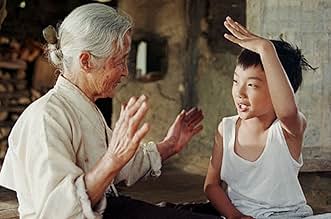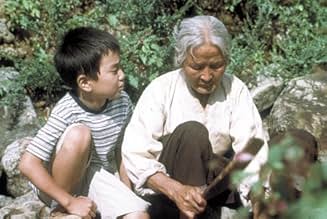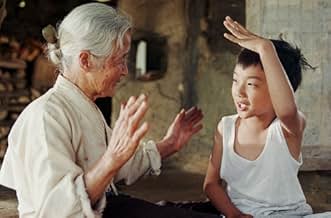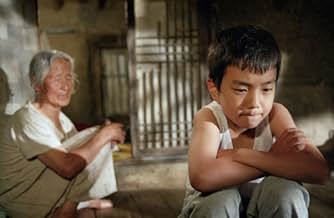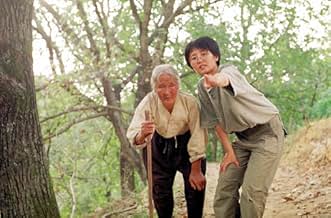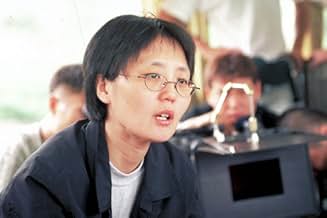IMDb RATING
7.7/10
6.2K
YOUR RATING
This is the story of a 7-year-old boy, Sang-woo, born and raised in the big city, and his mute grandmother, who has spent her whole life in a small rural village.This is the story of a 7-year-old boy, Sang-woo, born and raised in the big city, and his mute grandmother, who has spent her whole life in a small rural village.This is the story of a 7-year-old boy, Sang-woo, born and raised in the big city, and his mute grandmother, who has spent her whole life in a small rural village.
- Awards
- 12 wins & 11 nominations total
- Director
- Writer
- All cast & crew
- Production, box office & more at IMDbPro
Featured reviews
10Jamester
This is a most touching and honest love story. 'Love story', you may wonder?? Are we talking about the same movie? Indeed, the Way Home is a story about a grandson and grandmother with love in the agape tone as it's central theme. Perhaps it's because of the distance between the two: the urban vs the rural; the materialism versus the simple living; or the selfish versus the selfless -- the contrasting styles really make for an interesting comparison in views of the world.
There really was a huge chasm that had to be overcome at the start of this movie, and the action moved superbly in filling out the moments and telling a very visual story of crossing the chasm.
When I read that the director could have spent 2 months filming this movie by shooting in the most efficient manner possible (i.e. common location scenes shot all at once), but chose not to, I was floored. The director *chose* to shoot this movie in chronological sequence spending 6 months on it in order to ensure the emotional sequence would be intact and exact. What a *great* choice -- and it really showed through the movie making it absolutely AMAZING.
This is a very moving movie. I recommend it without reservation.
There really was a huge chasm that had to be overcome at the start of this movie, and the action moved superbly in filling out the moments and telling a very visual story of crossing the chasm.
When I read that the director could have spent 2 months filming this movie by shooting in the most efficient manner possible (i.e. common location scenes shot all at once), but chose not to, I was floored. The director *chose* to shoot this movie in chronological sequence spending 6 months on it in order to ensure the emotional sequence would be intact and exact. What a *great* choice -- and it really showed through the movie making it absolutely AMAZING.
This is a very moving movie. I recommend it without reservation.
After reading comments about this film by folks expecting some "big payoff" in the end and being disappointed, wanting to tweak the script to make it more exciting, surprised the grandmother didn't "shout" at the boy (are you for real?), that they were "bored" and the story was "depressing", I simply don't believe many of these people actually watched the movie. Maybe it's the lack of skill reading subtitles, the patience of a long-tailed-cat with ADD in a room full of rocking chairs, or ignorance of any other culture other than their own. Who knows? Maybe film class does have its merits. Some people need to be taught how to watch a movie.
I felt compelled to comment on this film because of its simplicity. I recently watched "Rabbit- Proof Fence" whose filmmakers fascinated me with their desire to utilize simple, native folk as actors. The actions and emotions portrayed in 'The Way Home' were simple, and with few words, a few gestures, sometimes one can say more than what's contained in a volume of text. I admire a filmmaker who can use the entire screen to tell a story, and make the audience feel without having to say a word. Even the music was quiet, and used sparingly.
'The Way Home' is a fine, brief glimpse into a culture clash between young and old, rich and poor (of money, and of spirit). I think it's also an important film for western cultures to embrace, since respect for our elders seems to have fallen by the wayside.
I felt compelled to comment on this film because of its simplicity. I recently watched "Rabbit- Proof Fence" whose filmmakers fascinated me with their desire to utilize simple, native folk as actors. The actions and emotions portrayed in 'The Way Home' were simple, and with few words, a few gestures, sometimes one can say more than what's contained in a volume of text. I admire a filmmaker who can use the entire screen to tell a story, and make the audience feel without having to say a word. Even the music was quiet, and used sparingly.
'The Way Home' is a fine, brief glimpse into a culture clash between young and old, rich and poor (of money, and of spirit). I think it's also an important film for western cultures to embrace, since respect for our elders seems to have fallen by the wayside.
Some of the reviews I read about "The Way Home" were disappointing. The critics dwell on the screenplay appearing too forceful, therefore unconvincing: how can the grandmother stand this obnoxiously rude kid? How can it be possible a kid is this obnoxious? Why would she keeps on taking care of him and loving him?
I think we've all judged Grandma by our own standards, but didn't try to stop and think that perhaps this is how she is. She lives a simple life, never complaint, never thought of change, never thought of improving her life style. She just simply accepts everything that's given and deal with it the way she knows how. Ask any one of us. Would we want to walk miles to retrieve buckets of water everyday up in the mountains? Would we want to have a hole to use as our bathrooms? We would stop and complain, become angry at whatever is doing this unfairness to us. To Grandma, this is her life and is all she knows. She accepts whatever life has given her and goes on day by day.
The film has shown her inability of complex thoughts. She attempts to play with the wood blocks, but unable to put the different shapes through the matching shaped holes. She has no concept of shapes, but that doesn't describe her as unintelligent, it rather suggests a untrained/simple mind. Unable to work the blocks, she simply tilts her head and walks away with no complaint or anger, which I don't think I can take the defeat so well. Whatever happens, good or bad, but life goes on. Grandson knocks over the rice bowl in anger, but Grandma immediately bends over and scooped the rice back in the bowl. Rice falls, needs to pick it up and eat it. Grandson rollerbladed around the room, dirties the floor. There is dirt, needs to wipe it off. As simple as that.
I deeply admire the grandmother character. I know I can never be like her. I am a selfish and demanding person that easily complain about a lot of little things, just like the grandson though not as annoying (I hope). It is HER alone that made this movie incredibly and realistically moving.
I think we've all judged Grandma by our own standards, but didn't try to stop and think that perhaps this is how she is. She lives a simple life, never complaint, never thought of change, never thought of improving her life style. She just simply accepts everything that's given and deal with it the way she knows how. Ask any one of us. Would we want to walk miles to retrieve buckets of water everyday up in the mountains? Would we want to have a hole to use as our bathrooms? We would stop and complain, become angry at whatever is doing this unfairness to us. To Grandma, this is her life and is all she knows. She accepts whatever life has given her and goes on day by day.
The film has shown her inability of complex thoughts. She attempts to play with the wood blocks, but unable to put the different shapes through the matching shaped holes. She has no concept of shapes, but that doesn't describe her as unintelligent, it rather suggests a untrained/simple mind. Unable to work the blocks, she simply tilts her head and walks away with no complaint or anger, which I don't think I can take the defeat so well. Whatever happens, good or bad, but life goes on. Grandson knocks over the rice bowl in anger, but Grandma immediately bends over and scooped the rice back in the bowl. Rice falls, needs to pick it up and eat it. Grandson rollerbladed around the room, dirties the floor. There is dirt, needs to wipe it off. As simple as that.
I deeply admire the grandmother character. I know I can never be like her. I am a selfish and demanding person that easily complain about a lot of little things, just like the grandson though not as annoying (I hope). It is HER alone that made this movie incredibly and realistically moving.
10shneur
The key to this movie is the contrast between the traditional "Eastern" values of Harmony and Inner Focus, and the intruding "Western" ones of Mastery and Acquisition. The seven-year-old protagonist brings with him the culture of the big city, Seoul in this case, but it could be anywhere, represented by his battery-operated game and the fact of his mother dumping him in the first place. He is confronted with his elderly grandmother, who simply refuses to engage him in the kind of outer battle he expects, neither to win it nor to lose it. We as audience continually visualize a "modern" parent either bullying this child into submission, or alternatively pandering to his oblivious self-centeredness. Instead, this caretaker evinces UNRELENTING respect for him as a human being: she never once blames, insults, or degrades him. Thus she sets him on the path of an inner journey which are left hoping will last a lifetime.
"Love makes us lessen our selfish and self-centered view of the world. Even the smallest kind word, or gentle loving gesture, has repercussions in the infinite
"- Lama Surya Das
Unconditional love is the ability to love someone exactly the way they are and the way they are not, without judgment or evaluation. With this kind of unconditional love, the well being of others becomes more important to us than our own. Spiritual teachers tell us that if we can silence the constant chattering of the mind, we can get in touch with this capacity. I know it is a big stretch for me, but for the wise old grandmother in the South Korean film, The Way Home, it is second nature. This film by Lee Jeong-hyang, one of Korea's few female directors, is this year's biggest box-office hit in South Korea and the first Korean film to receive major studio distribution in the United States. The grandmother, played with startling authenticity by first-time actress, 78 year-old Kim Eul-boon, conveys without speaking the redeeming power of love. Like the young Aboriginal girls in the Australian film Rabbit-Proof Fence, Kim had never even seen a movie before she was discovered in a talent search among rural villagers.
In The Way Home, Sang-woo (Yoo Seung-ho), an insufferable seven-year old boy from Seoul, is deposited at his grandmother's house in the remote village of Youngdong in Korea's Choongbuk province so the mother can have time to look for work. The grandmother's posture is stooped and her face is withered from years of hard work and she suffers from a chronic disability and cannot speak. She lives in a wooden hut carved into the hillside and the stunning cinematography magnificently captures the beauty and remoteness of this mountain retreat. Sang-woo is about the most spoiled and irritating boy that I have ever seen in films and one that would try the patience of St. Francis of Assisi. Full of street-smart know-it-all, he marches into grandma's home with his electronic toys, cans of Coca-Cola and Spam, and starts calling her dummy and byungshin (retard). When she asks what he wants to eat, he tells her "pizza, hamburger, and Kentucky Fried Chicken". She walks all the way to town to buy him a chicken but he won't eat it (until he is too hungry to resist) because it is boiled in a pot and not fried, Colonel-style.
Despite everything the boy does to her including stealing her shoes so she has to walk barefoot and removing a clasp for her hair so he can sell it to buy batteries for his Game Boy, she remains centered and loving. Rather than refusing to cater to his every whim, she becomes increasingly generous, cleaning and cooking for him and overlooking his stealing. He begins to accept the new lifestyle, helping his grandmother to thread a needle, hang up clothes on the clothesline, and shop with her at the market. Gradually he also learns about the meaning of kindness when he sees his grandmother give a package of vitamins to a dying man, and when a neighborhood boy, Hae-yeon (Yim Eun-kyung) forgives him for teasing him about a "crazy" runaway cow.
When Sang-woo's mother comes back to retrieve him, though undemonstrative, he has clearly changed. I was expecting a saccharine payoff, but Ms. Jeong-hyang wisely stays away from a melodramatic farewell that would be out of sync with the rest of the film. Besides, it isn't about the destination but the journey, and Sang-woo in his sojourn with grandma has learned some valuable lessons that become apparent by the end of the film. The Way Home is dedicated to all grandmothers around the world and speaks volumes about the power of loving-kindness to heal the hardest heart. Reminiscent of the Iranian film, The Wind Will Carry Us by Abbas Kiarostami, this is not just the umpteenth variation on the city slicker versus country bumpkin theme but a refreshing look at what truly makes a difference in life. With a lovely score by Kim Dae-hong and Kim Yang-hee, it is yet another example of the emotional power of films that do not require a huge budget, mind-boggling complexity, special effects, or even dialogue to work their magic. And magic it is indeed Have you hugged your grandmother lately?
Unconditional love is the ability to love someone exactly the way they are and the way they are not, without judgment or evaluation. With this kind of unconditional love, the well being of others becomes more important to us than our own. Spiritual teachers tell us that if we can silence the constant chattering of the mind, we can get in touch with this capacity. I know it is a big stretch for me, but for the wise old grandmother in the South Korean film, The Way Home, it is second nature. This film by Lee Jeong-hyang, one of Korea's few female directors, is this year's biggest box-office hit in South Korea and the first Korean film to receive major studio distribution in the United States. The grandmother, played with startling authenticity by first-time actress, 78 year-old Kim Eul-boon, conveys without speaking the redeeming power of love. Like the young Aboriginal girls in the Australian film Rabbit-Proof Fence, Kim had never even seen a movie before she was discovered in a talent search among rural villagers.
In The Way Home, Sang-woo (Yoo Seung-ho), an insufferable seven-year old boy from Seoul, is deposited at his grandmother's house in the remote village of Youngdong in Korea's Choongbuk province so the mother can have time to look for work. The grandmother's posture is stooped and her face is withered from years of hard work and she suffers from a chronic disability and cannot speak. She lives in a wooden hut carved into the hillside and the stunning cinematography magnificently captures the beauty and remoteness of this mountain retreat. Sang-woo is about the most spoiled and irritating boy that I have ever seen in films and one that would try the patience of St. Francis of Assisi. Full of street-smart know-it-all, he marches into grandma's home with his electronic toys, cans of Coca-Cola and Spam, and starts calling her dummy and byungshin (retard). When she asks what he wants to eat, he tells her "pizza, hamburger, and Kentucky Fried Chicken". She walks all the way to town to buy him a chicken but he won't eat it (until he is too hungry to resist) because it is boiled in a pot and not fried, Colonel-style.
Despite everything the boy does to her including stealing her shoes so she has to walk barefoot and removing a clasp for her hair so he can sell it to buy batteries for his Game Boy, she remains centered and loving. Rather than refusing to cater to his every whim, she becomes increasingly generous, cleaning and cooking for him and overlooking his stealing. He begins to accept the new lifestyle, helping his grandmother to thread a needle, hang up clothes on the clothesline, and shop with her at the market. Gradually he also learns about the meaning of kindness when he sees his grandmother give a package of vitamins to a dying man, and when a neighborhood boy, Hae-yeon (Yim Eun-kyung) forgives him for teasing him about a "crazy" runaway cow.
When Sang-woo's mother comes back to retrieve him, though undemonstrative, he has clearly changed. I was expecting a saccharine payoff, but Ms. Jeong-hyang wisely stays away from a melodramatic farewell that would be out of sync with the rest of the film. Besides, it isn't about the destination but the journey, and Sang-woo in his sojourn with grandma has learned some valuable lessons that become apparent by the end of the film. The Way Home is dedicated to all grandmothers around the world and speaks volumes about the power of loving-kindness to heal the hardest heart. Reminiscent of the Iranian film, The Wind Will Carry Us by Abbas Kiarostami, this is not just the umpteenth variation on the city slicker versus country bumpkin theme but a refreshing look at what truly makes a difference in life. With a lovely score by Kim Dae-hong and Kim Yang-hee, it is yet another example of the emotional power of films that do not require a huge budget, mind-boggling complexity, special effects, or even dialogue to work their magic. And magic it is indeed Have you hugged your grandmother lately?
Did you know
- TriviaAt the time of casting, Kim Eul-boon (Grandmother) had not only never acted before, but never even seen a film before.
- Crazy creditsBefore end credits: "Dedicated to all grandmothers"
- ConnectionsReferenced in Film Geek (2005)
- How long is The Way Home?Powered by Alexa
Details
- Release date
- Country of origin
- Official site
- Language
- Also known as
- Шлях додому
- Filming locations
- Production companies
- See more company credits at IMDbPro
Box office
- Budget
- $2,000,000 (estimated)
- Gross US & Canada
- $445,367
- Opening weekend US & Canada
- $29,737
- Nov 17, 2002
- Gross worldwide
- $24,952,738
- Runtime
- 1h 20m(80 min)
- Color
- Sound mix
- Aspect ratio
- 1.85 : 1
Contribute to this page
Suggest an edit or add missing content



